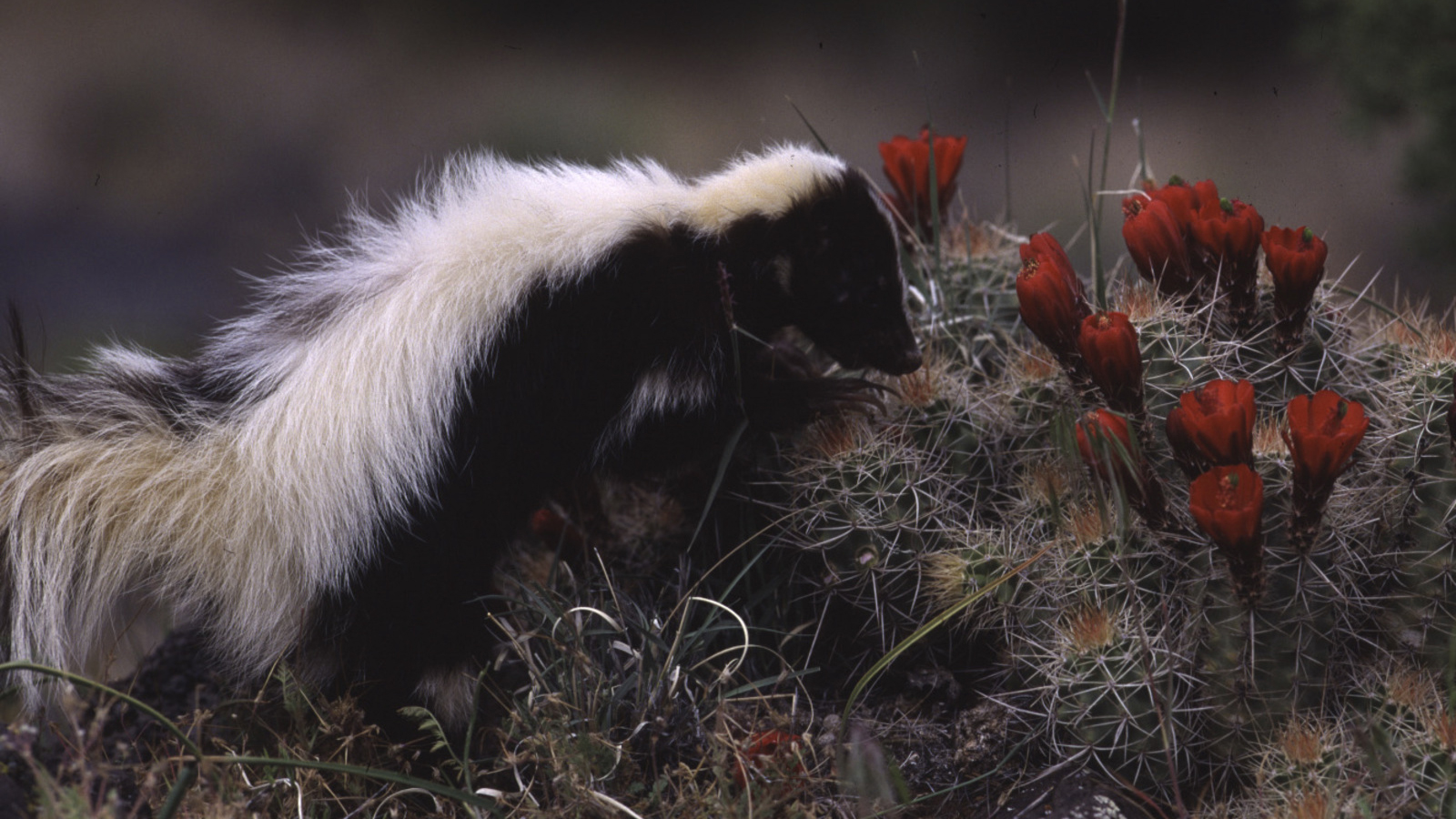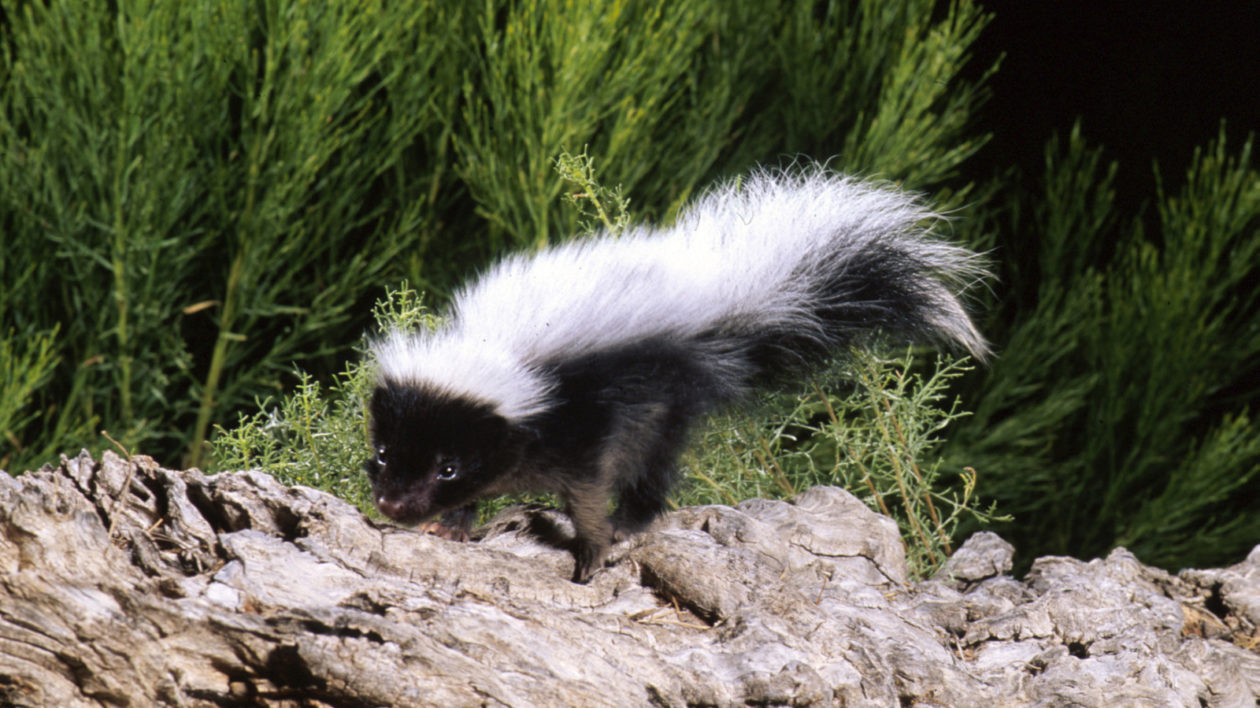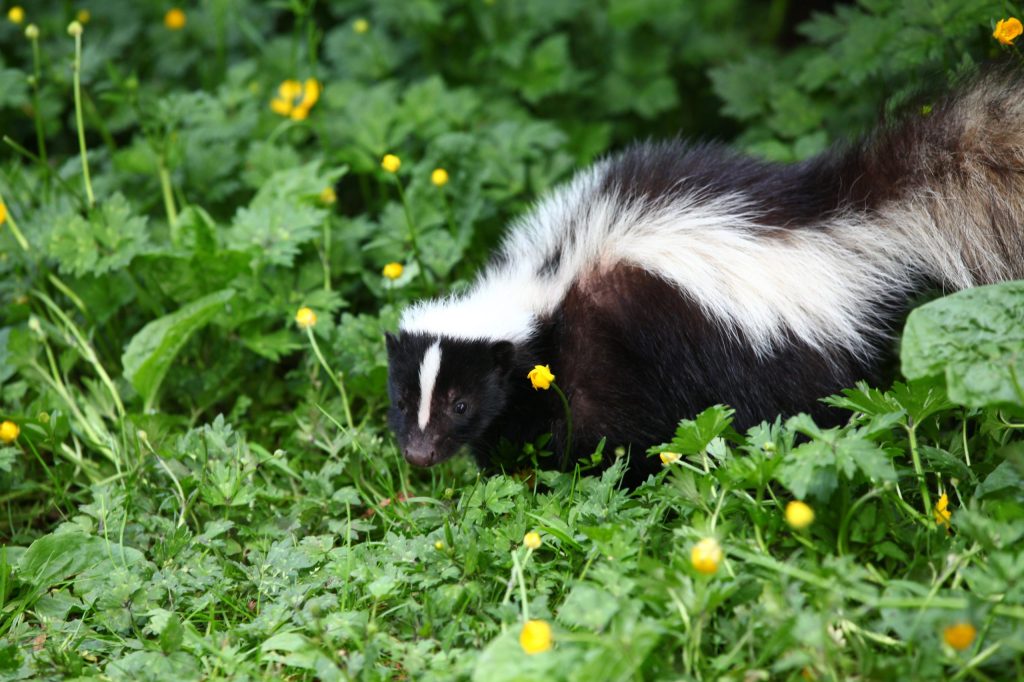On my drive to work this morning, I caught an unpleasant whiff of striped skunk several times. For the past week, skunk musk has assaulted my nostrils with increasing regularity. Perhaps you’ve noticed the same thing.
No, there isn’t a sudden population explosion of skunks. It’s all tied to their behavior. There are indeed times of the year when you’re more likely to smell a skunk. Here’s why.
Striped skunks are solitary, nocturnal critters. Despite thriving alongside humanity, they generally stay out of sight and out of mind. Given their propensity for spraying musk when threatened, you might think – given the high population likely living near you – you’d smell them all the time. Skunks spray as a last resort, and their survival depends on them being somewhat secretive.
But at times, they become very noticeable – sometimes due to their behavior and sometimes due to ours.
Striped skunks give birth to a litter of young, called kits, in the early spring. The kits are born naked, blind and helpless. The mother skunk goes out hunting and foraging and brings food back to the den until the skunks are two months old. Then they start joining her on forays, learning to dig insects and perhaps locate your garbage.
Being solitary, it is soon time for the young skunks to disperse. Depending on where you live, that’s right about now. So there are lots of young, relatively inexperienced skunks roaming around.

As I think back on skunk encounters, I’m struck by how often I have encountered them in August and September. I recall the night as a youngster I heard some rustling in our backyard. I led my mom and brother on my first of many night safaris. Suddenly a rather perturbed skunk appeared in my flashlight beam. I turned and ran, nearly knocking my mom over — and leaving my light-free family members to face the skunk in the dark. I still hear about my cowardice to this day.
Still, young skunks find themselves in much bigger trouble. The human environment offers no shortage of food: unattended pet food, garbage and litter, grubs and other insects, house mice, backyard poultry and their eggs, and other delicacies. Some skunks even specialize in bee hives, with mothers teaching young techniques for effectively extracting honey.
Suburbia is filled with potential den sites, with spaces under sheds, decks and homes providing ideal skunk condos.
This seeming skunk utopia comes with risks. The first is dogs. While coyotes, badgers and other predators avoid skunks, dogs have not gotten the memo. They attack skunks with abandon, leaving you to douse them with tomato juice or other concoctions that won’t work. (Interestingly, one suburban predator that successfully targets skunks is the great-horned owl. One notable owl nest contained nearly 60 skunks!).
An even bigger problem for skunks is roads. Skunks possess excellent senses of smell and hearing, but have poor eyesight. They are poorly equipped to deal with a car going 35 miles per hour.
Right now, a lot of young skunks are dealing with dogs and cars for the first time. You will smell the results.

There’s one other time of year when you’re more apt to smell these animals. That’s February, the mating season. Male skunks are fighting. Female skunks may be shooing away males they don’t want to mate with. All this stressful activity causes some musk to be deposited. It’s not as strong as you will find along the road: you might detect a slight skunky aroma emitting from under your shed in February. That’s from skunk activity.
You may not have even realized a skunk was living under your shed until this point.
The rest of the year, the most noticeable sign is when they dig in your yard. They leave small, circular holes around the yard. But they’re ridding your lawn of grubs.
Despite their bad reputation, striped skunks are actually low-key, low-maintenance neighbors.
Just keep an eye out for skunks on the road the next few weeks (actually, it’s a good idea to drive with wildlife in mind at any time of year). Tend your dog, your garbage and your chickens (also a good idea). And if you go out on a night safari in your neighborhood, make sure the whole family has flashlights.




I like skunks and do respect them ,but I enjoy seeing them and keep my distance.
we rescued albert/albertina during one horribly hot late summer…he/she was wonderfully smart and very understanding. we set up an umbrella for shade and fed him/her tomatoes and fruit and water. also an ice drip to help keep him/her cool…i made the “pest control” officer SWEAR on his mother’s life that he would release him/her into a safe skunk area. he did…and i can still hear him swearing at me because we had fed him/her and he/she sprayed him and got away. he/she was the dearest sweetest wild thing i’d ever met. i think of him/her still…
Thanks for the great information. I have a mama skunk we named Panda and her two babies living under our front porch. The baby’s names are Licorice and Oreo. They don’t bother our cats. They come out in the evening and do their skunk thing of digging in the ivy and picking up any peanuts the squirrels left behind.
They are fun to watch and they do no harm. We just fill in the holes they dig. They run away if they here us walking in the yard.
I’m glad they came to live in our yard. I hope they stay safe during this time of year.
I have owned very few dogs but have had several friends dogs, who were riding with me on hunting trips, that did not get the skunk memo 🙂
Given their propensity for cats, rabbits and other nocturnally active small mammals skunks are a natural part of the silent and powerful Great Horned Owl’s diet.
Great visual portrayed of your first night safari.
Thanks for the driving with critter awareness reminder!!
There is a resident skunk in my yard most evenings, and my cats interact with it regularly. The female cat will get aggressive with the skunk if I come outside when the skunk is present. They both engage in stiff postures, and the skunk always finds means to exit the area without spraying. It is very cear, skunks only spray when threatened with serious harm. It clearly takes more than a threat. Spraying is judicious protection against physical injury .
I have a young skunk that comes out of the woods at night and eats cat food. The cats ignore him and I sit quietly in my chair. It seems to only be afraid of the raccoons. I moved bowl of food up by his path so he doesn’t have to come down here. What else does he eat? Fruit? Veggies.
Hi Ingrid,
Thank you for your comment. I know it is enjoyable to watch wild animals feeding, but it is really best for the skunk if you do not feed it. The skunk will be quite adept at finding food on its own. If you feed wildlife, you could make it dependent or acclimated to people. This rarely ends well. It might visit a neighbor who is not tolerant of skunks, which could lead to the skunk’s death. It could also put the skunk in proximity of children and dogs. Skunks are very adaptable — and it will be happy to forage for grubs and other food nearby.
Your advise against feeding wild animals is not uncommon. There is another point of view.
Feeding wild animals is like having a pet that one allows outdoors, unless you also believe no pets should leave the house. Permanent prison punctuated by escapes.
“Life in a box is better than no life at all, I expect. You’d have a chance at least. You could lie there thinking: Well, at least I’m not dead.”
― Tom Stoppard, Rosencrantz & Guildenstern Are Dead
I hope this makes everyone be more sympathetic to our skunk population. When I get upset over the skunk smell or deer eating my vegetable garden , I remind myself that we took their habitat.
I love skunks. Never had a problem with them. Just back away and don’t bother them.
Tomato juice does work, I owned a Irish setter mix that got sprayed every year . I I’ve spent every spring buying cans of tomato juice.
Wow, great article – thank you! I’ve been smelling and seeing (unfortunately on the roads) more skunks than usual. I am happy to have a healthy population near my house, but very rarely do I smell them. So many critters are misunderstood.
Thanks for sharing this! I had a momma and 2 babies living under my shed and would see them out at night. now I only see 1 of the young skunks living there now and wondered what happen to the other sibling and the mother. I guess that explains it. I thought about having pest control remove it but I’m not sure what they do with it so I guess I’ll let it live under my shed and and make holes in my yard and flower beds..they are cute!
Pest control would kill the skunks, some of them shoot wildlife or drown them while in the trap. Even when pest control say they don’t kill them and they release them this is not true.
Great article.
Ahh thanks this explains so much!
My poor dog learned the hard way one August, and I can tell you the peroxide/soda/soap mix works – apply while still fizzing, but not on the face.
16 oz of hydrogen peroxide
1/4 cup baking soda
2 tablespoons dish soap
Works pretty well. My dog has been sprayed twice in the last month!!!
I still love skunks, despite being sprayed in the eyeball a while back during a live-trapping program.